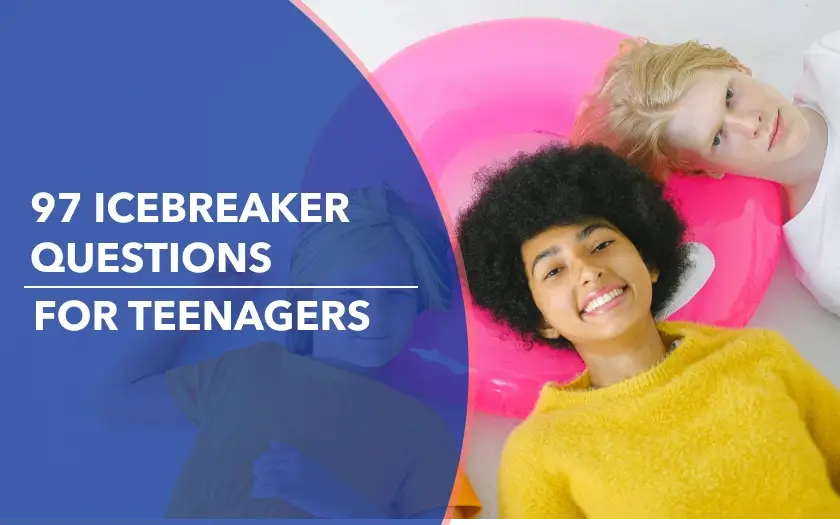Fun Icebreaker Questions for Teens


Getting teens to talk has never been simple, but in 2026, it’s more challenging than ever. Between increased screen time, shorter attention spans, and a growing preference for digital- first interaction, many teens feel hesitant speaking up in group settings. Whether they’re in a classroom, at a camp, or joining a session through a virtual event platform, silence and awkward pauses can show up fast.
That’s where icebreaker questions for teens come in. The right icebreakers lower social pressure, replace forced moments with shared laughter, and give teens an easy, low-stakes way to join the conversation. Instead of putting anyone on the spot, the right question opens the door to connection, and helps teens feel comfortable participating.
Whether you’re working with teens in person or online, having the right icebreaker questions ready can make all the difference. This article will give you a comprehensive list of fun icebreaker questions to help get the conversation rolling, get teens talking confidently, and build connection from the very first interaction.
{{table-of-contents}}
Quick Start: Most Popular Icebreaker Questions for Teens
.webp)
Need something that works instantly? These easy icebreaker questions for teens are simple to ask, easy to answer, and perfect for getting teens talking without overthinking.
- What’s one thing you’re really into right now that most people don’t know about?
- If you could instantly be amazing at one skill, what would you choose?
- What’s your go-to activity when you have free time?
- Would you rather spend a weekend at home or go out somewhere new?
- What’s a song you never get tired of listening to?
- If you could swap lives with anyone for a day, who would it be?
- What’s the best movie or show you’ve watched recently?
- Are you more of a morning person or a night owl?
- What’s one place you’d love to visit someday?
- If you could only eat one food for a week, what would it be?
- What’s something that always makes you laugh?
- If today had no rules, what’s the first thing you’d do?
Why Icebreaker Questions are Essential for Teens
Icebreaker questions, and other icebreakers for teenagers, play a powerful role in helping teens open up, especially in group settings, where social pressure and self-consciousness can hold them back. At a stage where identity, confidence, and belonging are still forming, the right teen icebreaker questions create space to share without fear of judgment.
Icebreaker questions for teens help by:
- Building confidence: Giving teens low-pressure opportunities to share their thoughts helps them feel more confident speaking up.
- Improving communication skills: Icebreakers encourage teens to articulate ideas, listen actively, and respond thoughtfully, skills that support both academic and social growth.
- Encouraging a sense of belonging: Sharing experiences and opinions helps teens recognize common ground with others, reducing feelings of isolation and strengthening group connection.
- Supporting emotional safety: Thoughtful questions set clear social boundaries, allowing teens to participate at their own pace without feeling judged or pushed to overshare.
In practice, icebreaker questions make group interactions smoother and more productive. When teens know what to expect and feel comfortable participating, conversations start faster, run more smoothly, and require less facilitation over time.
97 Icebreaker Questions for Teens (By Category)

Not all icebreaker questions do the same job. Some get laughs, some spark reflection, and some help teens connect quickly. To make things easier, we’ve grouped these icebreaker questions for teens by category, so you can quickly choose what fits your group, setting, and energy level.
17 Get to Know You Questions for Teens
These teen icebreakers help teens share a little about who they are, what they enjoy, and how they see the world. They’re ideal for kicking things off and helping everyone feel comfortable connecting right away.
- How do you usually like to spend your weekends?
- What’s something you’re really passionate about right now?
- Are you more of a planner or someone who goes with the flow?
- What’s your favorite way to relax after a long day?
- If you had a free day with no responsibilities, what would you do?
- What’s one hobby or activity you’d like to try in the future?
- Are you more of an indoor person or an outdoor person?
- What’s a small thing that instantly puts you in a good mood?
- If you could learn one new skill this year, what would it be?
- What’s your favorite way to spend time with friends?
- Do you prefer quiet time alone or being around lots of people?
- What’s something about you that people usually find surprising?
- What is your favorite song, and why does it resonate with you?
- Who's your favorite fictional character and why?
- What is your all-time favorite book or movie, and what makes it so special to you?
- Do you have a favorite quote or saying that you live by? If so, what is it and why does it inspire you?
- Is there a specific food or cuisine that you absolutely love? What do you enjoy about it?
17 Icebreaker Questions About Personal Interests

Personal interest icebreaker questions make it easy for teens to talk about what they enjoy without pressure. By focusing on hobbies and everyday activities, these questions help conversations feel familiar and welcoming in new group settings. They also offer insight into individual personalities and can naturally lead to more engaging, meaningful interactions within the group.
- What hobby do you enjoy the most in your free time?
- What kind of music do you usually listen to?
- Do you prefer watching movies, shows, or YouTube videos?
- What’s a sport or activity you enjoy playing or watching?
- Is there a game (video, board, or mobile) you never get tired of?
- What’s something you’re really good at?
- Do you like trying new hobbies, or do you prefer the ones you know?
- What’s your favorite way to spend time after school or classes?
- Are you more into creative activities or physical ones?
- What’s an interest you’ve picked up recently?
- If you could turn one hobby into a career, what would it be?
- What’s something you enjoy learning about outside of school?
- What's your favorite hobby, and why do you love it?
- If you could choose one skill to master overnight, what would it be and why?
- Have you ever tried any unique or unusual hobbies? If so, what were they and what did you enjoy about them?
- Do you prefer indoor or outdoor activities? What draws you to that particular setting?
- Have you ever had a hobby that turned into a lifelong passion or career? Tell us about it!
17 Funny & Lighthearted Icebreaker Questions for Teens

Funny icebreakers for teens bring energy and playfulness into conversations, helping teens loosen up and engage more naturally. Humor encourages participation through laughter and shared moments, making it easier to get conversations started and keep the group engaged. These questions work especially well for warming up a room and setting a positive, upbeat tone.
- If you could be any animal for a day, which one would you choose?
- What’s the weirdest food combination you actually enjoy?
- If your life were a movie, what genre would it be?
- What’s a song you secretly love but don’t always admit?
- If you had to eat the same meal every day for a month, what would it be?
- What’s something that instantly makes you laugh, no matter what?
- If you could switch lives with a cartoon or fictional character, who would it be?
- What’s the most random talent you wish you had?
- If you could rename yourself, what name would you choose?
- What’s a funny or embarrassing moment you can laugh about now?
- If you had to wear one outfit for a year, what would it be?
- What’s something you’re terrible at but still enjoy doing anyway?
- If you were an animal, which one would you be and why?
- If you could rename yourself, what name would you choose?
- What is the most adventurous thing you've ever done?
- If you could have any talent that you don't currently possess, what would it be and why?
- Imagine you had the ability to speak and understand any language instantly. Which language would you choose to learn and why?
12 Icebreaker Questions About Friends & Social Life
Friendships and social connections are a big part of teen life, which makes these icebreaker questions especially effective. They focus on everyday experiences teens relate to, such as hanging out with friends, social routines, and group dynamics. These questions work well once the group feels a bit more settled.
- What’s your favorite thing to do with friends?
- Are you the planner in your friend group, or do you go with the flow?
- Do you prefer hanging out in small groups or larger ones?
- What’s the best memory you’ve had with your friends recently?
- How do you usually spend time together: talking, gaming, going out, or something else?
- What’s something your friends know you for?
- Are you more likely to start conversations or wait for others to talk first?
- What makes someone a good friend, in your opinion?
- Do you enjoy meeting new people or sticking with your close circle?
- What’s a fun tradition or inside joke you share with your friends?
- How do you usually stay in touch with friends—texting, social media, calls, or in person?
- What’s one quality you really value in friendships?
17 “Would You Rather” & Hypothetical Icebreaker Questions
“Would you rather” and hypothetical icebreaker questions place teens in imaginative scenarios that encourage creative thinking and problem solving. Because these questions focus on imagined choices rather than personal experiences, they feel easier to answer, especially for teens who may not be comfortable sharing personal details in a new group. This makes participation feel more accessible while still keeping conversations lively and engaging.
- Would you rather travel to the past or the future?
- Would you rather spend a day without your phone or a day without music?
- If you could live anywhere in the world for a year, where would it be?
- Would you rather be able to fly or become invisible?
- If you could instantly master any skill, what would it be?
- Would you rather watch movies all day or play games all day?
- If you had a time machine, what time period would you visit?
- Would you rather explore space or the deep ocean?
- If you could create your own holiday, what would it celebrate?
- If you could only keep one app on your phone, which one would you choose?
- If you could swap lives with a fictional character, who would it be?
- Would you rather always know what to say or always know what to do?
- If you could have any superpower, what would it be and why?
- If you had a time machine, which period would you visit and why?
- Imagine you could live in any fictional world from a book or movie. Which one would you choose and why?
- If you could be any character from history, who would you be and what would you do?
- What would you do if you suddenly found yourself in a completely different country with no money or means to return home?
17 Future Aspirations Icebreaker Questions for Teens

These future aspirations icebreaker questions invite teens to reflect on their values, goals, and hopes for the future without feeling too personal or intense. By encouraging thoughtful discussion and respectful listening, these icebreaker questions support self-discovery while helping teens better understand themselves and the perspectives of others.
- What’s something you’re really proud of accomplishing?
- What’s a goal you’d like to work toward in the next few years?
- If you could give your future self one piece of advice, what would it be?
- What does success mean to you right now?
- What’s something you’d like to learn more about in the future?
- If you could change one thing about the world, what would it be?
- What motivates you when things feel challenging?
- Where do you see yourself in five or ten years?
- What’s a value or belief that’s important to you?
- What kind of impact would you like to have on others?
- What’s a dream you hope to achieve someday?
- Do you have any role models or mentors who have influenced your career aspirations?
- Where do you see yourself in ten years?
- If you could choose any profession, what would it be?
- What are some steps you plan to take to achieve your long-term goals?
- Are there any specific industries or fields that you are particularly interested in exploring?
- Do you have any role models or mentors who have influenced your career aspirations?
If you want questions that fit your group right away, tools like Remo’s free AI Icebreaker Question Generator can help you generate tailored icebreakers in seconds.
How to Craft the Perfect Icebreaker Questions for Teens

The best icebreakers for teenagers are designed to spark conversation, not shut it down with simple yes or no answers. Open-ended questions encourage teens to share their thoughts, interests, and experiences, helping conversations feel natural and engaging from the start.
The Art of Making Questions Fun and Engaging
Great icebreaker questions strike a balance between being fun and thoughtful. Questions that tap into teen-relevant topics like music, movies, hobbies, or everyday experiences help teens feel comfortable participating, while still leaving room for individuality and self-expression. For example, asking why someone enjoys a certain activity often leads to richer conversations than simply asking if they like it.
Balancing Intrigue and Comfort in Icebreakers
At the same time, it’s important to balance curiosity with comfort. Overly personal, sensitive or intense questions can make teens hesitant to participate, especially in new group settings. Lighthearted prompts and imaginative scenarios, such as hypothetical situations, help create a relaxed atmosphere where teens feel at ease.
Moreover, inclusivity also matters. Teens come from diverse backgrounds and comfort levels, so icebreaker questions should be respectful, flexible, and welcoming to everyone.
How to Choose the Right Teen Icebreaker Questions for Your Group
Even great questions can fall flat if they don’t fit the group or setting. Choosing the right icebreakers depends on who you’re working with and where the conversation is happening.
Consider the Group: Choose questions that match the group’s various differentiators to encourage participation.
- Group size: Smaller groups can handle more detailed responses, while larger groups benefit from quick, easy prompts.
- Age range: Younger teens often respond better to playful questions; older teens may enjoy reflective ones.
- Energy level: Match the questions to the group’s mood, high energy or low pressure.
- Comfort level: Start simple before moving into intense conversation.
Consider the Setting: These icebreaker questions work especially well in classrooms, school groups, camps, and other teen-focused settings where participation and inclusivity matter.
- For classrooms: Use inclusive, low-pressure questions that encourage participation without singling anyone out.
- For camps and youth programs: Choose high-energy, imaginative questions that promote bonding and shared experiences.
- For online or virtual groups: Opt for short, chat-friendly questions that are easy to answer and keep conversations flowing.
By keeping questions open-ended, engaging, and considerate of both group dynamics and setting, you create an environment where teens feel confident speaking up and connecting with others.
Want icebreaker questions tailored to your exact group, setting, or energy level? Try our free AI Icebreaker Question Generator to create personalized icebreakers in just seconds, perfect for classrooms, youth programs, camps, or virtual groups.
Tips for Using Icebreaker Questions with Teens
Teen icebreakers are most effective when teenagers feel relaxed, respected, and free to participate at their own pace. How you introduce and use these questions can make just as much difference as the questions themselves.
Don’t force answers: Not every teen will feel ready to speak up right away, and that’s okay. Participation should always be optional. Giving teens the choice to pass helps create a safer environment and often encourages quieter participants to join in later once they feel more at ease.
Start light before going deeper: Begin with fun, easy questions that don’t require much personal reflection. As the group warms up and confidence builds, you can gradually introduce more thoughtful or future-focused questions. This natural progression helps conversations feel easygoing rather than overwhelming.
Model answers yourself: Sharing your own response first shows teens what kind of answer you’re looking for and helps reduce uncertainty. It also signals that there’s no “right” answer, just honest ones, which can make teens more willing to participate.
Avoid overly personal topics early on: Questions that are too intense or personal can shut down conversation instead of opening it up. Stick to inclusive, age-appropriate topics at the start, and only move into more layered discussions once the group feels at ease and engaged.
When icebreaker questions are used thoughtfully, they create a supportive atmosphere where teens feel confident expressing themselves, listening to others, and building genuine connections.
Ready to Break the Ice?
Icebreakers don’t need to feel awkward or scripted. With the right questions, conversations start to flow, personalities shine through, and groups feel connected faster.
And if those conversations are happening online, having the right environment matters just as much as the questions. Platforms like Remo make it easy to turn icebreaker questions into real interactions, giving teens space to move, chat, and connect naturally in virtual events. Whether you’re planning a class, camp, or online session, book a demo today and experience how Remo brings people together in immersive virtual spaces.
Frequently Asked Questions about Icebreaker Questions for Teens
1. What are the best icebreaker questions for teens?
Open-ended, low-pressure, and relatable. Questions about music, hobbies, weekend plans, or fun “would you rather” scenarios work especially well because they’re easy to answer and help conversations start naturally.
2. What icebreaker questions work best for shy teens?
Funny, lighthearted, and hypothetical questions work best for shy teens. These questions don’t require personal disclosure and allow teens to participate at their own comfort level.
3. Can icebreaker questions work for online or virtual teen groups?
Yes, icebreaker questions work very well in online or virtual teen groups when they’re short, chat-friendly, and easy to respond to.
4. How many icebreaker questions should you ask in one session?
In most sessions, 5–10 icebreaker questions are enough to warm up the group. It’s better to allow time for conversation to develop naturally rather than rushing through too many questions.
5. How can you come up with the best icebreakers for your group?
The best icebreakers depend on your group’s age, setting, and energy level. Start by thinking about how well the group knows each other and what kind of interaction you want to encourage. If you want a faster option, you can use Remo’s free AI Icebreaker Question Generator to create highly tailored icebreaker questions in seconds based on your specific needs.







.webp)


.webp)

















